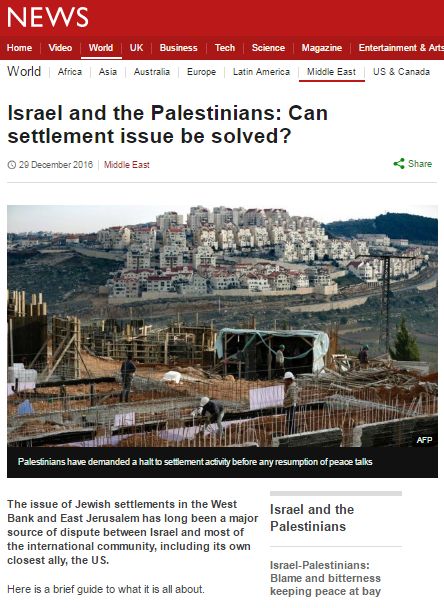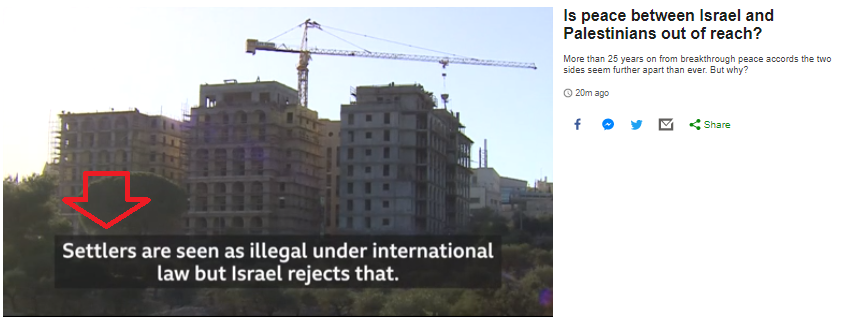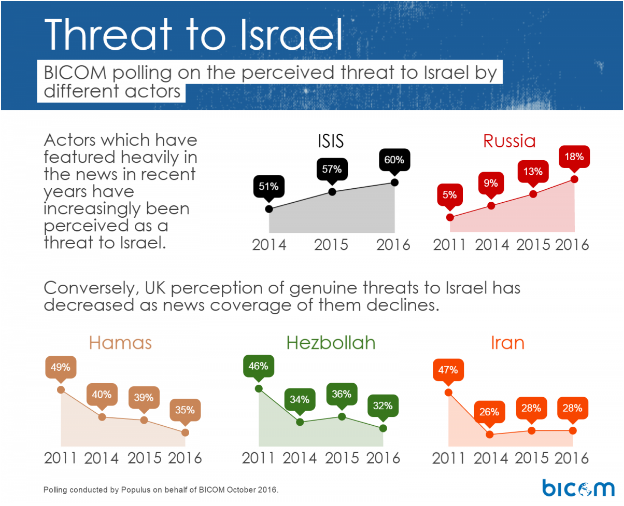One of the most frequently recurring topics in the BBC’s Israel-related related content is that of ‘settlements’ and particularly construction in the places described as such. Examples from the past year alone include:
The return of the BBC’s political narrative on Israeli construction
BBC’s Yolande Knell reports from Gush Etzion – part one
BBC’s account of Quartet report exposes the holes in its own narrative
BBC’s Knell airbrushes two-thirds of Quartet report out of the picture
Another BBC airbrushing of the Quartet report
BBC News continues to cultivate its settlements narrative
More BBC promotion of the ‘Peace Now’ narrative on construction
BBC amplifies UN criticism of Israeli PM without providing relevant context
BBC News pushes settlements narrative in report on another topic
BBC News amplifies inaccurate US claim of ‘new settlement’
The majority of the BBC’s reports include a standard insert:
“About 500,000 Jews live in more than 100 settlements built since Israel’s 1967 occupation of the West Bank and East Jerusalem. The settlements are considered illegal under international law, though Israel disputes this.”
As has been observed here on countless occasions, that standard insert breaches the corporation’s own editorial guidelines on impartiality by failing to inform BBC audiences of the existence of legal opinions which contradict the corporation’s own adopted political narrative.
Particularly given that repeated failure to meet the BBC’s professed standards of ‘due impartiality’ it was interesting to see that on December 29th (in the wake of UNSC resolution 2334 and John Kerry’s related speech) the BBC News website published a backgrounder – titled “Israel and the Palestinians: Can settlement issue be solved?” – which opens as follows:
“The issue of Jewish settlements in the West Bank and East Jerusalem has long been a major source of dispute between Israel and most of the international community, including its own closest ally, the US.
Here is a brief guide to what it is all about.”
To the credit of whoever wrote this article (readers are not informed of the author’s identity) it includes context which, as has been frequently documented on these pages, BBC audiences have been denied for years. [emphasis added]
“Settlements are communities established by Israel on land occupied in the 1967 Middle East war.
This includes the West Bank, East Jerusalem and the Golan Heights. The West Bank and East Jerusalem had previously been occupied by Jordan since the 1948-49 Arab-Israeli War.”
And:
“Israel has also established settlements in the Gaza Strip, seized from Egypt in the 1967 war, but it dismantled them when it withdrew from the territory in 2005. It also built settlements in the Sinai Peninsula, seized too from Egypt in 1967, but removed them in 1982 as part of a peace agreement with Cairo.”
And:
“Under the 1993 Israel-Palestinian Oslo peace accords, the issue of settlements was to be deferred until final status talks – a reason why Israel objects to pre-conditions and UN resolutions on the matter.”
Later on in the article, in answer to the question “So is a deal on settlements impossible?”, readers are told:
“Not necessarily, despite appearing insurmountable. Israel has said it is prepared to make “painful concessions” for peace, and it has previously shown it will relinquish settlements – such as in Sinai and Gaza, and four small sites in the West Bank in 2005.
It has agreed to negotiate the fate of existing settlements, and Jerusalem, as part of permanent status talks.
Israel has said in any final deal it intends to keep the largest settlement blocs, which are close to the pre-1967 ceasefire line.
This position seemed to get the endorsement of the US under former President George W Bush, who, in a letter to Prime Minister Ariel Sharon in 2004, said it was “unrealistic” to expect a full withdrawal from the West Bank in a final peace deal.”
The writer could have also mentioned the Clinton Parameters and the Olmert Plan at this point – both of which included proposals for keeping the large settlement blocs in situ in return for land swaps. Nevertheless, this is only the second time in the whole of the past year that BBC audiences have been alerted to the existence of that possibility, with the corporation’s content more usually found promoting the PLO narrative of ‘settlements as an obstacle to peace’ and amplifying its demand for their complete removal.
In a section headed “Are settlements illegal under international law?” readers find the following:
“Most of the international community, including the UN and the International Court of Justice, say the settlements are illegal.
The basis for this is the 1949 Fourth Geneva Convention which forbids the transfer by an occupying power of its people into occupied territory.
However, Israel says the Fourth Geneva Convention does not apply de jure to the West Bank because, it says, the territory is not technically occupied.
Israel says it is legally there as a result of a defensive war, and did not take control of the West Bank from a legitimate sovereign power.
It says the legal right of Jewish settlement there as recognised by the 1922 League of Nations Mandate for Palestine was preserved under the UN’s charter.
The US describes the settlements as “illegitimate” and has refrained from calling them “illegal” since the Carter administration in 1980.
In December 2016, a UN Security Council resolution said settlements had “no legal validity and constitute[d] a flagrant violation under international law”. However, like previous resolutions on Israel, those adopted under Chapter VI of the UN Charter are not legally binding.”
While more could have been done to help audiences understand the legal background to the view held by Israel (and others too), it is extremely rare to find any mention of pre-1967 history in BBC content relating to the topic of Israeli communities in Judea & Samaria and the parts of Jerusalem occupied by Jordan for 19 years from 1948.
This article could have done more to explain to readers why the branding of Judaism’s most holy site and the Jewish Quarter in the Old City of Jerusalem as ‘occupied territory’ is so contentious. It should also have mentioned the much neglected topic of Jewish land ownership prior to 1948 in locations such as Hebron, Gush Etzion and Neve Ya’akov which the BBC now describes as ‘occupied’.
Unsurprising to those following the BBC’s portrayal of this topic over time is the inclusion in this article of data provided by the political NGO ‘Peace Now’.
“According to the Israel anti-settlement group Peace Now, there are 131 settlements in the West Bank, comprising about 385,000 Israeli Jewish settlers, and 97 outposts – settlements built without official authorisation.
The group says there are 12 settlements in East Jerusalem, inhabited by about 200,000 settlers.”
The article also directs readers to a partisan report on the website of another political NGO which campaigns on the same topic – B’Tselem – with the promotion of that link obviously compromising BBC impartiality.
“Built-up settlement areas occupy about 2% of the West Bank but critics point out that the land controlled by settlement activity, such as agriculture, amounts to much more than that and requires heavy military presence.”
While this backgrounder is by no means perfect, it does at least present a more nuanced picture than is usually the case and includes information which BBC audiences have been denied for too long. Whether or not future BBC reports on this topic will follow suit remains to be seen.
Related Articles:
Examining the BBC’s claim that Israeli building endangers the two state solution
BBC tells audiences location of centuries-old Jewish habitation is an ‘illegal settlement’




